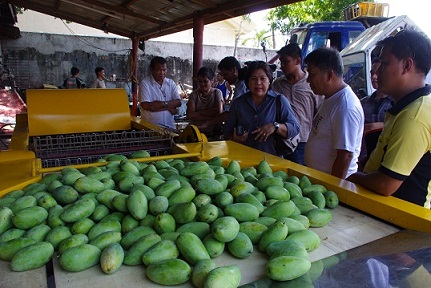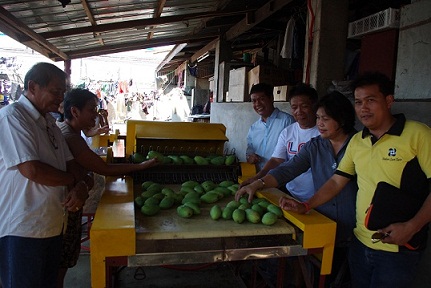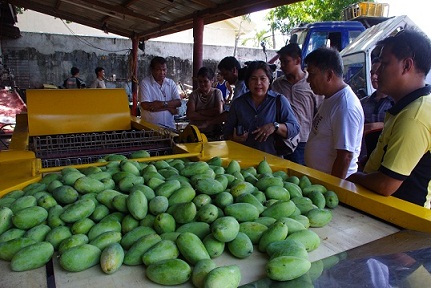By LEILANIE G. ADRIANO
 AT the warehouse of farmer Ricardo Tolentino in Laoag, Ilocos Norte are the sweetest and juiciest mangoes, courtesy of a hot water treatment developed at the Mariano Marcos State University (MMSU).
AT the warehouse of farmer Ricardo Tolentino in Laoag, Ilocos Norte are the sweetest and juiciest mangoes, courtesy of a hot water treatment developed at the Mariano Marcos State University (MMSU).
The technology was the answer to the problem of mango growers in the Northern Philippines who have been have been losing about 30 percent of their harvest due to anthracnose and stem-end-rot— the common diseases of ripening mangoes.
With a P1.5-million research grant from the Department of Science and Technology (DOST), technical experts from the Mariano Marcos State University (MMSU) were able to develop the first of its kind automatic hot water treatment (AHWT) that guarantees sweet and juicy mangoes with longer shelf life.
Thomas Ubiña, project team leader of the AHWT for mangoes, said during a demonstration of the machine at Tolentino’s warehouse that the occurrence of mango diseases has been reduced to one percent because of this simple technology.
The AHWT features an energy-efficient, user-friendly machine with easy adjustment temperature and speed settings. It has the capacity to isolate immature mangoes when these float at the conveyor filled with lukewarm water for treatment. Along with Ubiña, other technical experts from MMSU—Samuel Franco, Willen Mark Manzanas, Romaric Ascaño, Dr. Gliceria Pascua and Prof. Maria Luisa Gabriel—helped in the research and development of the AHWT.
The Ilocos Norte Mango Stakeholders Association Inc., which was represented by Tolentino as its president, said mangos treated with hot water has significantly lowered the incidence of common mango diseases compared to untreated mangoes. The association is the first recipient and project co-operator of AHWT.
“The clean and latex-free treated mangoes also ripen uniformly compared to the varied ripening of untreated mangoes. They also taste sweeter and their flesh looks juicier and firmer,” MMSU researchers added.
 According to Ubiña, the development cost of the machine is about P435,000 but the amount can still be reduced for commercialization. He said the AHWT is a first of its kind in the country designed to help mango producers increase their income by reducing cost of post-harvest handling and allow even ripening of mangoes when treated.
According to Ubiña, the development cost of the machine is about P435,000 but the amount can still be reduced for commercialization. He said the AHWT is a first of its kind in the country designed to help mango producers increase their income by reducing cost of post-harvest handling and allow even ripening of mangoes when treated.
He added that the machine can treat 1.5 tons (1,361 kilograms) of mangoes for one-minute immersion, 350 kilograms for five-minute immersion, and 150 kilograms for 10-minute immersion. The treatment cost ranges from 20 centavos to one peso (P1) per kilogram.
Traditionally, mango producers used calcium carbide to induce ripening of mangoes—a method that may be harmful to humans.
Other provinces like Palawan have already expressed interest to purchase the machine, which may take about two months to reproduce two units.
In the Philippines, Ilocos region tops mango production every year, according to a statistics report of the Philippine Council for Agriculture, Aquatic and Natural Resources Research and Development (PCARRD). It exports mango to Hongkong, China and Japan.
However, there had been a decline in production in the last five years due to pest and diseases affecting mango plantations all over the country. Of the more than 550 metric tons produced in the country in 2010, only about 10 percent was exported apparently for failure to meet quality standards.
With continued innovation and technology advancement, Jonathan Viernes, provincial director of the DOST based in Ilocos Norte, hopes to help more stakeholders particularly micro, small and medium enterprises to become competitive in the global market.
